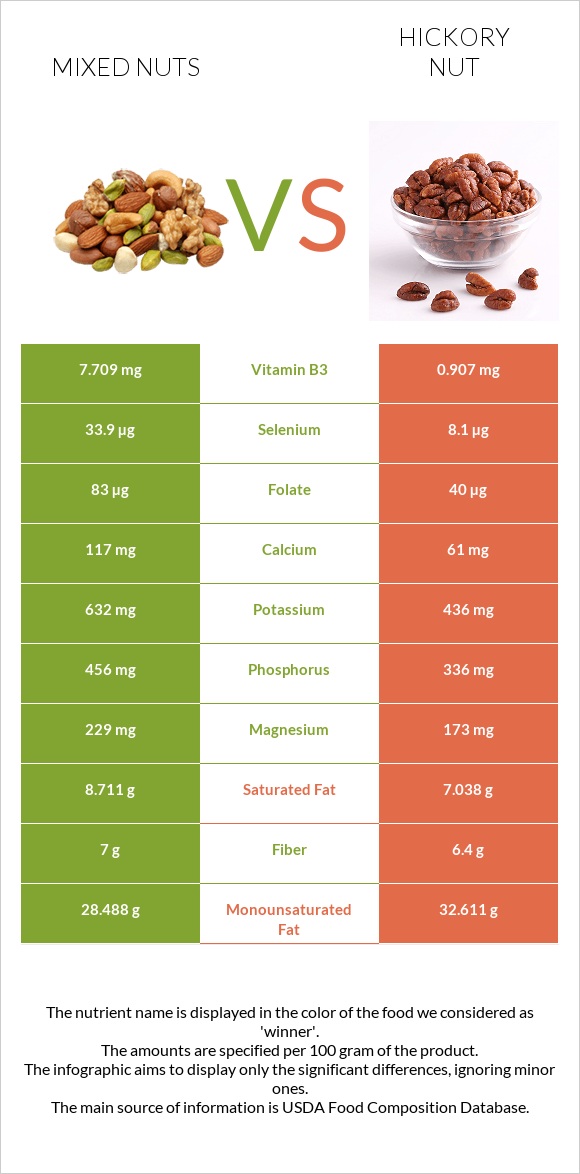Mixed nuts vs. Hickory nut — In-Depth Nutrition Comparison
Compare
What are the differences between mixed nuts and hickory nut?
- Mixed nuts are higher in selenium, vitamin B3, copper, phosphorus, magnesium, vitamin B6, and folate, yet hickory nut are higher in manganese, vitamin B1, and vitamin B5.
- Hickory nut' daily need coverage for manganese is 112% more.
- Mixed nuts have 8 times more vitamin B3 than hickory nut. While mixed nuts have 7.709mg of vitamin B3, hickory nut have only 0.907mg.
We used Nuts, mixed nuts, oil roasted, with peanuts, without salt added and Nuts, hickorynuts, dried types in this article.
Infographic

Infographic link
Mineral Comparison
Mineral comparison score is based on the number of minerals by which one or the other food is richer. The "coverage" charts below show how much of the daily needs can be covered by 300 grams of the food.
| Contains more MagnesiumMagnesium | +32.4% |
| Contains more CalciumCalcium | +91.8% |
| Contains more PotassiumPotassium | +45% |
| Contains more IronIron | +23.1% |
| Contains more CopperCopper | +22.9% |
| Contains more PhosphorusPhosphorus | +35.7% |
| Contains more SeleniumSelenium | +318.5% |
| Contains more ZincZinc | +28.3% |
| Contains less SodiumSodium | -80% |
| Contains more ManganeseManganese | +126% |
Vitamin Comparison
Vitamin comparison score is based on the number of vitamins by which one or the other food is richer. The "coverage" charts below show how much of the daily needs can be covered by 300 grams of the food.
| Contains more Vitamin EVitamin E | +∞% |
| Contains more Vitamin B2Vitamin B2 | +49.6% |
| Contains more Vitamin B3Vitamin B3 | +749.9% |
| Contains more Vitamin B6Vitamin B6 | +83.3% |
| Contains more Vitamin KVitamin K | +∞% |
| Contains more FolateFolate | +107.5% |
| Contains more Vitamin CVitamin C | +300% |
| Contains more Vitamin AVitamin A | +∞% |
| Contains more Vitamin B1Vitamin B1 | +358.7% |
| Contains more Vitamin B5Vitamin B5 | +53.2% |
All nutrients comparison - raw data values
| Nutrient |  |
 |
DV% diff. |
| Manganese | 2.04mg | 4.61mg | 112% |
| Vitamin B1 | 0.189mg | 0.867mg | 57% |
| Vitamin E | 7.82mg | 52% | |
| Polyunsaturated fat | 14.612g | 21.886g | 48% |
| Selenium | 33.9µg | 8.1µg | 47% |
| Vitamin B3 | 7.709mg | 0.907mg | 43% |
| Copper | 0.907mg | 0.738mg | 19% |
| Phosphorus | 456mg | 336mg | 17% |
| Fats | 53.95g | 64.37g | 16% |
| Protein | 20.04g | 12.72g | 15% |
| Magnesium | 229mg | 173mg | 13% |
| Vitamin B5 | 1.14mg | 1.746mg | 12% |
| Vitamin B6 | 0.352mg | 0.192mg | 12% |
| Folate | 83µg | 40µg | 11% |
| Monounsaturated fat | 28.488g | 32.611g | 10% |
| Zinc | 3.36mg | 4.31mg | 9% |
| Choline | 52mg | 9% | |
| Saturated fat | 8.711g | 7.038g | 8% |
| Calcium | 117mg | 61mg | 6% |
| Potassium | 632mg | 436mg | 6% |
| Iron | 2.61mg | 2.12mg | 6% |
| Vitamin B2 | 0.196mg | 0.131mg | 5% |
| Vitamin K | 5.7µg | 5% | |
| Calories | 607kcal | 657kcal | 3% |
| Vitamin C | 0.5mg | 2mg | 2% |
| Fiber | 7g | 6.4g | 2% |
| Starch | 4.2g | 2% | |
| Carbs | 21.05g | 18.25g | 1% |
| Vitamin A | 0µg | 7µg | 1% |
| Net carbs | 14.05g | 11.85g | N/A |
| Sugar | 4.15g | N/A | |
| Sodium | 5mg | 1mg | 0% |
| Trans fat | 0.055g | N/A | |
| Tryptophan | 0.22mg | 0.139mg | 0% |
| Threonine | 0.703mg | 0.422mg | 0% |
| Isoleucine | 0.826mg | 0.576mg | 0% |
| Leucine | 1.656mg | 1.027mg | 0% |
| Lysine | 0.782mg | 0.497mg | 0% |
| Methionine | 0.283mg | 0.3mg | 0% |
| Phenylalanine | 1.182mg | 0.713mg | 0% |
| Valine | 1.001mg | 0.73mg | 0% |
| Histidine | 0.572mg | 0.389mg | 0% |
| Omega-3 - EPA | 0.005g | 0g | N/A |
| Omega-3 - ALA | 0.082g | N/A | |
| Omega-6 - Eicosadienoic acid | 0.013g | N/A | |
| Omega-6 - Linoleic acid | 14.455g | N/A |
Macronutrient Comparison
Macronutrient breakdown side-by-side comparison
Protein:
20.04 g
Fats:
53.95 g
Carbs:
21.05 g
Water:
2.08 g
Other:
2.88 g
Protein:
12.72 g
Fats:
64.37 g
Carbs:
18.25 g
Water:
2.65 g
Other:
2.01 g
| Contains more ProteinProtein | +57.5% |
| Contains more CarbsCarbs | +15.3% |
| Contains more OtherOther | +43.3% |
| Contains more FatsFats | +19.3% |
| Contains more WaterWater | +27.4% |
Fat Type Comparison
Fat type breakdown side-by-side comparison
Saturated fat:
Sat. Fat
8.711 g
Monounsaturated fat:
Mono. Fat
28.488 g
Polyunsaturated fat:
Poly. Fat
14.612 g
Saturated fat:
Sat. Fat
7.038 g
Monounsaturated fat:
Mono. Fat
32.611 g
Polyunsaturated fat:
Poly. Fat
21.886 g
| Contains less Sat. FatSaturated fat | -19.2% |
| Contains more Mono. FatMonounsaturated fat | +14.5% |
| Contains more Poly. FatPolyunsaturated fat | +49.8% |




